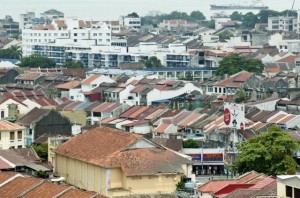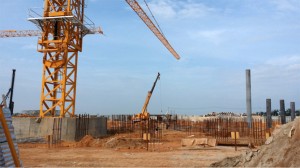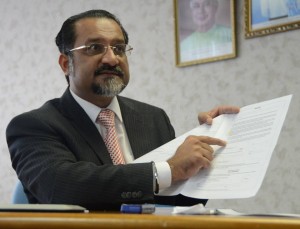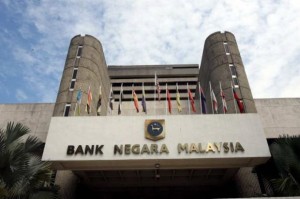
Fresh off a successful run of pumping RM17.5 million in grants to inject energy into George Town, Think City is seeking to replicate its success by partnering the public and local governments of the national capital and Butterworth. — Picture by K.E.Ooi
If you live in Kuala Lumpur, George Town or Butterworth and have ideas to make your city a better place to live, you can tap Think City for its new RM30 million public grant for urban renewal.
Fresh off a successful run of pumping RM17.5 million in grants to inject energy into George Town, Think City is seeking to replicate its success by partnering the public and local governments of the national capital and Butterworth, a township on Penang’s mainland that has undergone a development boom in recent years.
Think City’s Hamdan Abdul Majeed said Butterworth was chosen as it was a counterpart to its more popular cousin on the island — George Town — and is a typical “secondary city” where there is generally a “narrow population base, limited sense of opportunities” and is struggling to find its own identity.
For the country’s capital city Kuala Lumpur, Hamdan said the organisation will focus on its downtown — a one kilometre radius from Masjid Jamek — which houses the city’s roots and history, along with multiple heritage buildings.
“Each of the city, the focal point will be different,” said the CEO of state investment arm Khazanah Nasional’s wholly-owned subsidary when announcing the new grant programme today.
“We hope we’ll be able to get support and participation from the wider public through the grants programme,” he told reporters here.
The expected RM30 million figure for the fund over the next three years is based on the annual RM8 to RM10 million allocated to Think City by Khazanah Nasional’s foundation — Yayasan Hasanah.
Anyone from individuals, NGOs, schools, community councils, private property owners to companies may apply for grants of between RM10,000 to RM100,000 through forms available on Think City’s website: www.thinkcity.com.my/tcgrants
The projects can be wide-ranging including public art, but a key criteria will be sustainability — where projects can live on even if grants are no longer given out, Hamdan said.
“Typically a lot of grants will focus on restoration of buildings, improvement of public spaces, cultural; could also be activities in the city, urban mobility projects, what I call innovative and creative ideas about making the city better, greening, making the urban environment more conducive,” he said, also adding that applications for grant amounts beyond RM100,000 could be considered based on the projects’ impact to the cities.
The deadline for the first round of application is January 31, 2015, with ThinkCity then carrying out an eight-week assessment before announcing the approved grants in early April.
Think City is still assessing the impact of its previous grant program on George Town and is expected to announce the historic city’s inclusion in the same RM30 million Think City Grants Programme in the second quarter next year.
Think City has already started laying down the groundwork for its foray into the fourth city on its list, the Iskandar Malaysia economic corridor in Johor, with possible plans to extend the grants to the fast-booming city.
Hamdan said Think City is focusing on arts and culture in Iskandar and is trying to identify areas where they can “fill in the gaps” in the rapidly-developing city.
“For example, possibility is there to have a proper signage system, to improve green environment in the city,” he said, pointing out that a city is not merely a “block of buildings”.
Economic impact, better living
Think City thinks it can help quadruple the amount of money being pumped in to regenerate the cities, when matched against disbursements of its own public grants.
“Our experience shows that we are able to get a ratio of one to four, meaning for every dollar we put in, they are able to attract three to four dollars into the project. This is not in any way even estimating the spillover effects,” Hamdan said.
In Think City’s George Town experience, every RM1 disbursed in grant saw private stakeholders putting in an additional RM6, with stakeholders investing RM98.4 million against Think City’s RM16.4 million during the 2010-2013 period.
According to Think City, 87 heritage buildings were restored and 600 jobs were created in the UNESCO heritage site George Town as a result of its grant programme – which eventually came to a total of RM17.5 million for over 240 projects in the past four years.
Hamdan said Think City aims to add value to existing projects and initiatives, saying: “We are very happy that in each of the city that we are looking at, there’s already a momentum in the cities. So we are confident to say that in the next three to four years, we are expecting positive outcomes from these kind of collaborations.”
Hamdan also spoke on the need for an “urban movement” where every citizen would take “ownership” of their cities.
“Seventy-five per cent of Malaysians live in cities, it’s no longer a case of rural community. But then urban living is very challenging, so how do you make urban living better? That’s where the whole idea of having an urban movement is very essential to ensure our cities are liveable and sustainable,” he said.
Source: The Malay Mail Online
 The construction sector is expected to remain attractive next year amid a weaker domestic currency due to lower demand for commodities and the general public apprehension over the goods and services tax (GST).
The construction sector is expected to remain attractive next year amid a weaker domestic currency due to lower demand for commodities and the general public apprehension over the goods and services tax (GST).
 State excecutive councillor for Housing and Town & Country Planning Jagdeep Singh Deo has lashed out to irresponsible tenants of low cost (LC), low-medium cost (LMC) and affordable housing housing renting out their units when it is a clear breach of tenancy agreement.
State excecutive councillor for Housing and Town & Country Planning Jagdeep Singh Deo has lashed out to irresponsible tenants of low cost (LC), low-medium cost (LMC) and affordable housing housing renting out their units when it is a clear breach of tenancy agreement.
 Federal development agencies JKP Sdn Bhd and the Penang Regional Development Authority (Perda) have agreed to comply with state requirements on their projects in Penang.
Federal development agencies JKP Sdn Bhd and the Penang Regional Development Authority (Perda) have agreed to comply with state requirements on their projects in Penang.